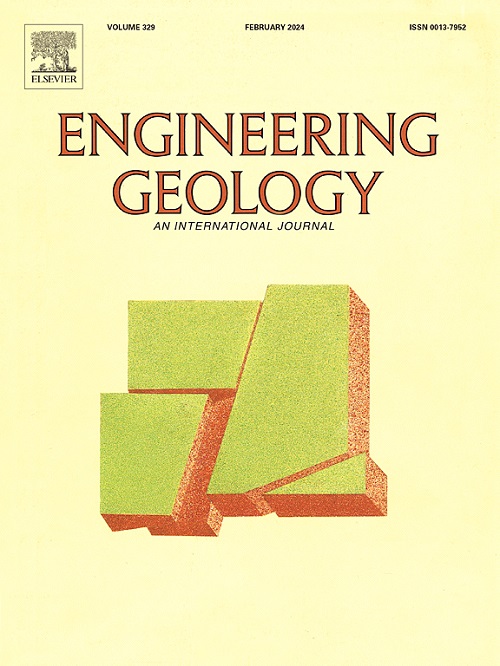Predicting cyclic liquefaction behavior of saturated granular materials using an updated state evolution model
IF 6.9
1区 工程技术
Q1 ENGINEERING, GEOLOGICAL
引用次数: 0
Abstract
Liquefaction and dynamic response of granular materials under dynamic loading has been studied intensively in field and laboratory tests. However, theoretical modeling and analytical solutions on liquefaction are still lagging and investigations are mostly restricted to laboratory observations. To investigate undrained liquefaction shear deformation and fluidity of granular material, the updated state evolution model is proposed by introducing an excess pore water pressure ratio parameter. A series of undrained cyclic triaxial tests and DEM simulations are conducted to verify the proposed model. The result indicates that the liquefaction behavior of granular materials can be captured by the updated state evolution model both at constant and varying loading frequency. Furthermore, the state parameter based on the deviatoric strain and excess pore water pressure ratio is determined to quantify assess the fluidity of granular materials. It facilitates the refinement of the discriminative criteria for cyclic liquefaction of granular materials. This parameter increases slowly at the beginning of loading, followed by a rapid and fluctuating rise, and reaches the peak before the initial liquefaction. Another significant finding is that the turning point of the state parameter range from 0.89 to 0.95 in the plane and between 0.84 and 0.94 in the plane, as affected by the cyclic loading conditions.
利用最新状态演变模型预测饱和颗粒材料的循环液化行为
在现场和实验室试验中,对颗粒材料在动态荷载作用下的液化和动态响应进行了深入研究。然而,有关液化的理论建模和分析解决方案仍然滞后,研究大多局限于实验室观测。为了研究颗粒材料的排水液化剪切变形和流动性,通过引入过剩孔隙水压力比参数,提出了更新的状态演化模型。为了验证所提出的模型,进行了一系列不排水循环三轴试验和 DEM 模拟。结果表明,更新后的状态演化模型可以捕捉到恒定加载频率和变化加载频率下颗粒材料的液化行为。此外,还确定了基于偏离应变和过剩孔隙水压力比的状态参数,以量化评估颗粒材料的流动性。这有助于完善颗粒材料循环液化的判别标准。该参数在加载开始时缓慢上升,随后快速波动上升,并在初始液化前达到峰值。另一个重要发现是,受循环加载条件的影响,状态参数的转折点在 θ-t/t0 平面上介于 0.89 至 0.95 之间,在 θ-ru 平面上介于 0.84 至 0.94 之间。
本文章由计算机程序翻译,如有差异,请以英文原文为准。
求助全文
约1分钟内获得全文
求助全文
来源期刊

Engineering Geology
地学-地球科学综合
CiteScore
13.70
自引率
12.20%
发文量
327
审稿时长
5.6 months
期刊介绍:
Engineering Geology, an international interdisciplinary journal, serves as a bridge between earth sciences and engineering, focusing on geological and geotechnical engineering. It welcomes studies with relevance to engineering, environmental concerns, and safety, catering to engineering geologists with backgrounds in geology or civil/mining engineering. Topics include applied geomorphology, structural geology, geophysics, geochemistry, environmental geology, hydrogeology, land use planning, natural hazards, remote sensing, soil and rock mechanics, and applied geotechnical engineering. The journal provides a platform for research at the intersection of geology and engineering disciplines.
 求助内容:
求助内容: 应助结果提醒方式:
应助结果提醒方式:


